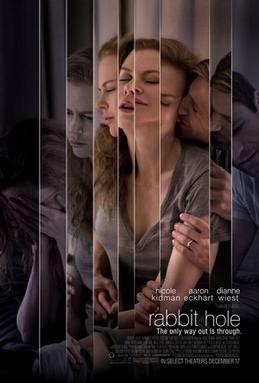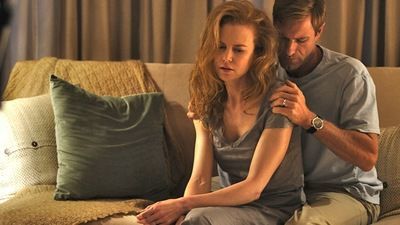RABBIT HOLE
The reactions to the mourning process exercised by Becca (Nicole Kidman) and Howie (Aaron Eckhart) are almost polar opposites: the former determined to push forward despite whatever pain is buried inside, the latter to linger in the memories of the son that is gone forever. It is a fair argument that neither is a good coping method for the extremely difficult circumstance they find themselves in because neither addresses the core question in Rabbit Hole: how to continue living when your life has been torn asunder by cruel fate?
In fact, the emotional torture both endure (one by suppressing the agony, one by wallowing within it) ultimately is how both return to each other emotionally in an effort to rebuild their life together.
Becca and Howie move through their lives, physically together but emotionally apart after the loss of their son, Danny. While he takes great comfort in a support group for parents who've lost children, Becca finds the platitudes she hears contemptible and foolish. She is especially aggravated by Kevin and Gabby (Steven Mailer and Sandra Oh), who continue coming to Group as all refer to it even after eight years since their child has died.
Becca makes it very clear she won't go back, but Howie continues to go. It appears that no matter where she turns, Becca finds reminders of children: in Danny's room, the child seat still in the car, with her own mother Nat (Dianne Wiest), who still carries memories of the thirty-year-old son she lost, and with her reckless sister Izzy (Tammy Blanchard), who has no job prospects but is pregnant by her musician boyfriend Augie (Giancarlo Esposito).
As much as Becca strives to move beyond Danny's death, Howie can't seem to put his ghost away. Every night, he takes his phone and looks at the last video he took of his family when they were all together and happy. Howie nurtures and cradles the images as if they were Danny himself.
Eventually, their divergent views on how to deal with Danny's death is to seek out comfort not with each other, but with other people, one with the one who hurts like him and the other with the one who inadvertently hurt her. Becca spies Jason (Miles Tenner), the teen who accidentally killed Danny in that accident, and begins to meet with him.
She discovers Jason to be a simple teen who is quiet and almost innocent about his role in Danny's death. He apologizes to Becca by telling her he might have been going faster than the speed limit: instead of going thirty miles per hour, he might have been going thirty-one, maybe thirty-two. Jason gives her a copy of the comic book he created, called Rabbit Hole, and tells her the story he created that involves alternate universes.
By the end of Rabbit Hole, Becca does confront the agony she thinks she's stronger than, Howie accepts that he does have to let go, and both see that there can be life after death.
Whatever discomfort there is in the subject matter is handled with great care by David Lindsay-Abaire (adapting his stage play) and director John Cameron Mitchell. Lindsay-Abaire creates for the most part realistic people and situations to inhabit Becca and Howie's world.
There is a birthday party for Izzy at a bowling alley where Becca believes that her non-baby related gift is inappropriate to a maternity outfit Nat has given her younger daughter. Becca, in a barely concealed tone of frustration, insists on taking it back and giving her something more related to Izzy's condition, even after Izzy insists her gift is fine. There is even a resulting fight between Becca and Nat over the comparisons between the loss of their children, and it all sounds authentic, real, not like dialogue.
It is because Lindsay-Abaire resists the temptation to give grand statements for the characters to speak; instead, he allows them to sound like average people who are caught in terrible circumstances.
It isn't to say that some of the scenes between the brittle Becca and the ghost-like Howie aren't difficult to watch. To its credit, Rabbit Hole doesn't have them screaming at each other at every turn although some of the fights between them, especially dealing with Howie's telephone video, are especially hard to witness. Instead, most of the time they are arguing they speak in at most above average tones, presenting their points of view not with dispassion but with restraint of how to behave. It not only makes it more realistic but also more painful.
Much credit should be given to Mitchell, who does not drown the situation with a heaviness but allows the characters to be fully-dimensional. It would have been easy to make one or the other the villain, but both Becca and Howie are presented as flawed people who come at the situation from two wildly different points and yet reach the same conclusion: they do love and need each other and that they have to rebuild their lives both as individuals and their life as a couple.
The performances by everyone in the cast, even the smaller roles, are true to life. Blanchard, in my view an underused actress, creates in her Izzy a woman who is unapologetic about being more irresponsible in her private life: her first scene involves getting bailed out by her more responsible sister, but she also shows Izzy as a sister who cares about Becca. There is quite a difficult scene in Rabbit Hole at a grocery store, and while Kidman has to carry the agony it builds to, Blanchard matches Kidman in her quite and moving response to the situation.
Teller appears a little blank as Jason, but this is not a flaw. Rather, he plays Jason as a quiet, good kid, who just got caught up in an especially tragic situation not of his own making, and since I believe most teen boys are a little blank, I hold that Teller did a good job.
Wiest is in strong form here, her Nat being a woman who cares and loves her daughters but can't seem to help either through their situations. There is no effort to make Nat either an all-wise mother or a clueless harpy, but a real woman who reaches out the best way she can and who, in spite of the difficulties she unwittingly causes, makes clear will be there for both her surviving children.
The biggest burden goes to the leads, and both Kidman and Eckhart prove what strong actors they are when given the opportunity with a good script and strong directing. Eckhart makes Howie into a man who feels so much that grief gives him purpose, to where removing anything related to Danny somehow means seeing him die again. Whenever he looks at the video, we see a man not just mourning what he's lost but also what could have been.
He is not a saint (especially in his dealing with Gabby or when he does explode about Jason), but he is clearly the more emotional of the two. It is one of his best performances, one where the agony of loss is registered so deeply within Howie eventually shifts to a more realistic understanding of what will happen when both of them return to a sense of normalcy.
Kidman matches him as Becca, a woman who loves her son but does not want to be metaphorically haunted by his ghost. She takes a more blunt attitude to dealing with Danny's death: she will move on, she will move on is her unspoken mantra. In spite of it all, of all her declarations, she does feel pain, and when it does show it becomes all the more heartbreaking because in a sense she created the situations that lead to her moments (note the plural) of misery. Given that the roles Kidman has played post The Hours have been rather sub par (The Stepford Wives, Bewitched, Australia), we were in danger of forgetting that she is rather a good actress. Films like Rabbit Hole remind us of her talent: in her Becca, she channels grief behind a mask of acceptance, somehow attempting to go from Stage One to Stage Five in one fell swoop.
If I find any criticism of Rabbit Hole, is in to whom Becca and Howie reached out to. There was a danger in turning his relationship with Gabby into something more than it should be, and one wonders if it almost sadistic for Becca to start a friendship with the person responsible for her son's death, albeit with no malice or intent to harm. It's a minor point, but it is a bit puzzling as to how both came to the wrong people.
I go back to the dialogue and directing. Near the end of Rabbit Hole, Becca and Nat are alone in the basement. Becca asks her mother if it ever goes away. There is no attempt to sugarcoat the nature of the truth, no big speech, no effort to build this into a grand moment. It's actually rather quiet, when Nat tells her that grief does not go away, but eventually it becomes bearable.
We are left at the end of the film with questions about where they will eventually end up but we do end with a sense of hope for both of them, that Becca and Howie will be able to survive all this and share the burden of sorrow rather than carry it separately. While the end doesn't spell it out for us, it's as happy an ending as possible under the circumstance: their mutual need for each other.
DECISION: B+




No comments:
Post a Comment
Views are always welcome, but I would ask that no vulgarity be used. Any posts that contain foul language or are bigoted in any way will not be posted.
Thank you.